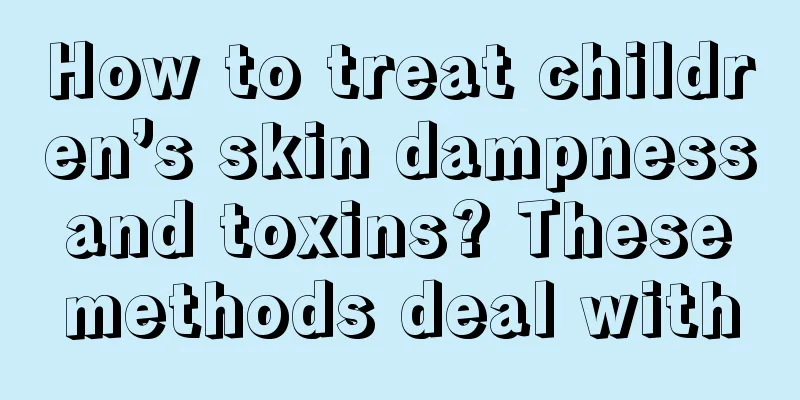How to treat children’s skin dampness and toxins? These methods deal with

|
If a child has skin problems with dampness and toxins, parents can take targeted treatment measures based on the actual situation, such as improving the living environment, improving the diet, adjusting the child's mood, etc. If the condition is serious, medication is required. 1. General prevention and control principles Look for possible causes, such as work environment, living environment, living habits, diet, thoughts and emotions, as well as the presence or absence of chronic lesions and internal organ diseases. (1) Working or living environment: If the workplace or living area is frequently damp, the moisture will accumulate over time and invade the human body, especially newborns and children aged 3-6 years old. Therefore, you must take moisture-proof measures and avoid living in damp places for a long time. (2) Lifestyle habits: For example, if you like to use hot water to soak your feet and rub your calf skin while washing, the hot water will "scald" away the fat in the calf area. Human skin has its own barrier function, and secreting oil can prevent the skin from becoming too dry. If you take a shower every day and wash off all the grease, your skin will become very dry, especially in winter, which can easily cause your own resistance to decrease and cause symptoms such as skin itching. (3) Diet: Vegetables, fruits, fish and milk are indispensable in the daily diet. They can inhibit skin inflammation. If children consume too little of these foods, it may induce dampness and toxins. In general, patients with eczema should eat mainly vegetarian food, which is easy to digest and does not affect the stomach and intestines. Their bowel movements should be smooth every day. They should avoid spicy, irritating, fishy and wind-inducing foods such as seafood, milk, eggs, etc. Commonly used medicinal foods that strengthen the spleen and remove dampness, such as winter melon and lotus seed soup, mung bean and red bean soup, are effective in preventing eczema. River products such as lotus seeds, lotus roots, lotus leaves, water chestnuts, etc. are also good for the skin. (4) Thoughts and emotions: Depression, tension, anxiety, and fear are very detrimental to eczema and can induce and aggravate the condition. Therefore, it is important to control children’s emotions. 2. Internal therapy Choose antihistamines to relieve itching, and use two together or alternately if necessary. Generalized eczema can be treated with oral or injected corticosteroids, but they should not be used for a long time. (1) Antihistamines: such as diphenhydramine, phenergan, chlorpheniramine, cyproheptadine, etc. They can be used alone or in combination, depending on the doctor's advice. Of course, it can also work together with sedatives, vitamin C, etc., and also have certain effects. (2) Glucocorticoids: Long-term or short-term use of large doses of topical hormonal preparations can cause addiction and lead to drug-dependent dermatitis. 3. Topical therapy Choose appropriate dosage form and medicine according to the condition of skin lesions. The selection of topical agents should be based on the manifestation of skin lesions. If there is obvious redness and swelling and a lot of exudation, a solution of cold wet compress can be used; if erythema or papules appear, lotions, emulsions, oils or ointments can be used; if blisters or erosions appear, oils are needed; if scales and scabs appear, ointments should be used; if it is a lichenoid lesion, muds, emulsions, ointments, tinctures, coatings and plasters are often used. For acute eczema, local washing and wet compresses with normal saline, 3% boric acid or 1:2000-1:10000 potassium permanganate solution, and calamine lotion for astringency and protection. Subacute and chronic eczema can be treated with appropriate glucocorticoid creams, tar preparations or immunomodulators, such as tacrolimus ointment, pimecrolimus ointment, and Shiduqing Capsules. It should be noted that when using Shiduqing Capsules, children must be under adult supervision. Add antibiotic preparations for secondary infection. |
<<: How to treat dampness and toxins in children? Do you understand these methods?
>>: How to treat keratitis in children? Do you understand these methods?
Recommend
How to quickly treat toothache in children
As the saying goes, "Toothache is not a dise...
How tall and heavy is a two-year-old and two-month-old baby?
After a child is born, there will be some changes...
What should I do if mycoplasma pneumoniae is infected in children?
Mycoplasma is a pathogenic microorganism that is ...
What should children eat to improve their physical fitness?
Some children are born with good physical constit...
What should I do if my baby has a runny nose for a week?
If your child has a runny nose all the time, you ...
What is the cause of the child's thinning hair?
Parents naturally hope that their children can ac...
What is the lung capacity of primary school students?
Many of us know that primary school students have...
How to correct hunchback in teenagers?
In fact, in daily life, it is not difficult to fi...
Why is the five-month-old baby restless?
The body of a five-month-old baby has begun to de...
Two and a half year old child walks unsteadily
Two and a half year old child walks unsteadily If...
What to do about growing pains
Growing pains refer to the pain that our babies f...
What is the reason why children are so active?
Children's hyperactivity is just a sign of yo...
What to do if half of the baby tooth is broken
Broken deciduous teeth are a problem that many ch...
How many times should I get chickenpox vaccination?
Generally speaking, we all need to be vaccinated ...
Why do three-month-old babies like to suck their fingers?
Every baby will like to suck his fingers as he gr...









